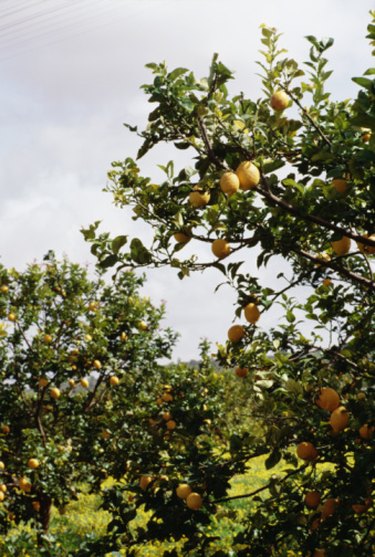
Home gardeners grow lemon trees for the tangy fruit they produce. Lemons are most commonly used as a flavoring for beverages and foods, especially desserts. Lemon trees are susceptible to damage from cold weather and insect infestations that can affect their health and vigor. Certain species of insects feed on the leaves of the trees, causing them to become defoliated.
Types
Video of the Day
Lemon tree leaves often suffer from feeding injuries from sucking insects such as spider mites. Spider mites are not actually spiders, but they are members of the spider family. These are very tiny pests and difficult to spot without a magnifying glass. Populations of this pest increase during the warm, humid summer months. Another serious and damaging pest of lemon trees is the citrus leafminer. Native to Asia, the citrus leafminer was first discovered in the United States in 1993. This pest attacks all citrus, but grapefruit, lemon and lime are favored hosts. The citrus leafminer feeds on new foliage, causing extensive damage to lemon trees. The larval form of this moth is responsible for damage to leaves. Warm, humid summer weather is favorable for citrus leafminer development. While the damage to lemon trees by this pest can be extensive, the citrus leafminer does not usually kill the host tree.
Video of the Day
Effects
Spider mite feeding causes lemon tree leaves to have a speckled appearance and leaves often turn bronze. Excessive spider mite feeding can cause lemon tree leaves to drop from the tree prematurely. Spider mites also feed on the fruit itself, causing fruit to be smaller at harvest. The citrus leafminer damages young lemon tree leaves, but rarely feed on the fruit. This pest lays its eggs on the upper and lower lemon leaf surfaces. Citrus leafminers may have between six and 13 generations each year.
Non-Chemical Control
Light infestations of spider mites on your lemon trees are best controlled by spraying your tree with a hard jet of water twice weekly. This knocks spider mites from lemon leaves, reducing their population. Washing your lemon tree with soapy water may also help control spider mites. Natural predatory insects feed on spider mites and the citrus leafminer. Lady beetles, green lacewings and parasitic wasps all feed on these pests keeping their numbers low. If natural predatory insects are present on your lemon tree and actively feeding on pests, avoid placing insecticides on your tree because these products kill the predatory insects as well.
Chemical Control
Heavy infestations of spider mites often require the use of chemical control products. Miticides are available for spider mite control at your local garden center. Since these products work on contact with spider mites, be sure to apply them in a manner that thoroughly covers the lemon tree leaves. Concentrate on the lower leaf surfaces, since this is where spider mites congregate. There are currently no chemical control methods recommended for the control of citrus leafminers.